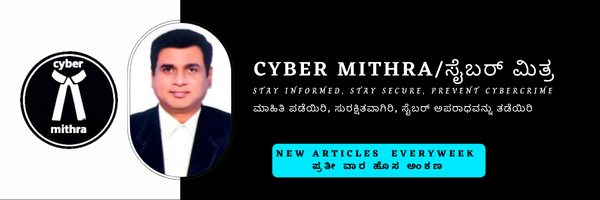Beware of new Digital Arrest cyber fraud
Rashmi, 23 year old from faridabad, haryana got a call from a Mumbai police officer stating her that a complaint has been registered against her for cyberstalking and then connects the call to her superior lady officer over whatsapp video call, where she also adds that a bank account opened in mumbai in her name was used for money laundering. Rashmi pleads that she is not involved in anything and she has never travelled to mumbai, the lady officer categorically states that her aadhaar is involved with the SIM card used for cyberstalking and bank account and till the investigation is over she will be put under digital arrest, where by she cannot disclose about this to anyone and anyone she discloses will also be added as partner in crime, nor switch off the call. This goes on for unbelievably 17 days and in the meantime, Rashmi was forced to transfer all her savings amounting to 2.5 lakhs to avoid being physically arrested.
Similar “Digital Arrest” incidents have been reported across India, where cyber criminals scare victims, incite panic by using threatening language, fabricating proof, and demanding large sums of money in order to escape any legal repercussions. In this scam, con artists pose as law enforcement authorities, including police or customs agents(check my courier fraud article), and trick people into thinking they are about to be digitally arrested for spurious legal offenses.
In India, there is no legal provision for digitally arresting or restricting the movement or locking a person for any crime during the investigation period. Delhi police have arrested 4 people in one of the cases related to digital arrest scam. There has been a Public Interest Litigation(PIL) in Delhi High Court against proliferation of cyber crimes including “digital arrest” scams, on which the Delhi HC has asked the response from central and state government.
Precautions on how to protect oneself from Digital Arrest scams :-
- Always follow the principle of ‘ Zero Trust, Pause and Authenticate’ for all digital transactions and messages/offers from unknown people.
- Remain composed and raise doubts about the veracity of the circumstances. Legitimate legal issues are usually resolved by official processes rather than by sudden actions.
- Confirm the allegation by checking with nearby police station or cyber helpline or with you lawyer before responding or acting on their instructions.
- Get FIR details raised against you and then verify the details in nearby police station or on online FIR verification websites provided by various state police.
- Never click on a hyperlink or scan a QR code or install any App provided in a message or mail by a stranger.
- Never share personal sensitive information like Aadhaar or PAN details or your bank account or credit/debit card details.
- Beware of demands for money transfer over phone/internet, threats of urgent legal action, and unusual ways of payment by strangers.
If you are a victim of Digital Arrest fraud :-
Immediately call 1930 cyber helpline or file a complaint at cybercrime.gov.in website or nearby police station. Report and lodge a complaint with the bank/courier company website about the fraud. Raise a debit freeze on the amount transferred. If you think your device is infected with a malware, format it or factory reset after taking backup.
Legal remedies available to the victim :-
You can register a criminal case at your nearest cyber or regular police station, under the following legal sections or the Act as per sections prescribed by the police based on your case :
- Section 378(Theft), 419 (punishment for cheating by impersonation) and 420 (cheating and dishonestly inducing delivery of property), Section 424(extract data illegally), Section 441(criminal trespass), Section 467(Forgery), Section 468(Punishment for Forgery), and Section 471(Usage of Forged document) of Indian Penal Code(IPC)
- Section 43 (Penalty and compensation for damage to computer, computing device etc.), section 65 (Tampering with computer), section 66 (punishment for computer related offences – a person committing data theft, transmitting virus into a system, destroying data, hacking, or denying access to the computer or network to an authorized person), section 66C(which prescribes penalties for identity theft and states that anyone who fraudulently or dishonestly uses a person’s identity information) and Section 66D (punishment for fraud by impersonation using computer resources) under of the Information Technology Act(IT) Act 2000.



Such an informative post you did on “Beware of new Digital Arrest cyber fraud”. Really helpful post. Digital Arrest cyber fraud preys on unsuspecting victims with enticing schemes; verify before you engage. Also read – Emerging Trends in Cybercrime and the Indispensable Role of Lawyers